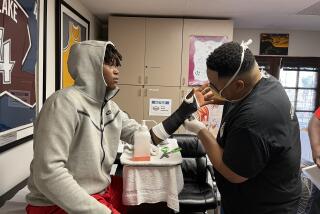For Ceman, Life Isn’t Just a Beach
- Share via
Broken glass in the sand. A seashell shard.
These are the things that Canyon Ceman fears the most.
They could send him to the hospital for days, making him feverish, disoriented and delusional.
Ceman has lymphedema, a disease with symptoms similar to some of those that affect pro golfer Casey Martin. Ceman’s symptoms, which affect his left leg, are less severe than those of Martin, whose battle to use a golf cart in tournaments made national headlines.
Ceman, a top pro beach volleyball player despite his condition, has been hospitalized eight times, most recently in March and May. His left leg weighs five to 10 pounds more than his right leg because his lymphatic system chronically fails to remove bacteria and other fluids with the same efficiency in which they are introduced to the leg.
In all aspects of everyday life, Ceman, 31, must be careful not to cut his feet, legs or toes, particularly when he’s on the beach, as he will be this weekend when he plays in the Huntington Beach Open, south of the Huntington Beach Pier. He occasionally wears “sand socks” to protect his feet while on the beach, but he doesn’t like the feel of them so he normally plays barefoot, as do most players.
Any scrape or cut could start an infection in his left leg, which has had a faltering lymphatic system since Ceman was born. The lymph nodes fail to move bacteria out of the leg, which can become swollen and hot with the slightest introduction of infection.
If the infection worsens, Ceman becomes feverish and has to be hospitalized. His body temperature sometimes reaches 104 degrees.
“The first 24 to 48 hours, I’m pretty messed up, pretty delusional,” Ceman said. “I’ll wake up sweating in the middle of the night. They’ll have to change the sheets and they’ll be soaked again by the next morning. I’m disheveled in every way.”
After the fever subsides, Ceman is left with a severely swollen leg that is sensitive to every movement, every twitch of muscle fiber.
“If I was to move it, or get up out of bed, I’d be in a lot of pain because the vessels are all inflamed,” he said. “I just don’t move. I stay immobile with the leg elevated.”
Ceman’s hospital stays can last as long as five days.
Even when he feels well, he must be cognizant of his condition.
At home, he sleeps with a large beanbag under his leg to keep it propped up. When he watches TV, he hoists his leg up on a sofa cushion. He wears a compression garment that goes from his toes to his waist.
“If you get your body too fatigued or stressed, it leaves you more susceptible to [infection],” Ceman said. “A lot of work, a lot of partying and a lot of training is not a good idea. I can’t do everything I want to.”
Exercise cleanses Ceman’s system, yet, it can be the most dangerous thing for him.
Last April, at an AVP Pro Beach Volleyball Tour tournament in Tempe, Ariz., Ceman sliced two of his toes on the jagged edge of a sponsor’s courtside metal sign.
He obsessed over keeping the wound clean, snipping off the fingertips of surgical gloves and placing them over his toes before wrapping them in bandages and athletic tape.
“Any person with a healthy lymphatic system, you’d have a bright red toe, you’d put on Neosporin and it would be fine,” he said. “My lymph system is not functioning. [Bacteria] stagnates in there and intensifies in there and goes systemic.”
Nothing came of that cut, though. For once, he turned out to be fine.
In fact, he won the tournament with Mike Whitmarsh.
“It’s a very difficult situation for Canyon,” said Emily Iker, the doctor who has treated him for most of the time since he was diagnosed. “Canyon is a Superman. He’s a star for all lymphedema patients. He’s shown he can still win with his condition.”
Ceman, the 1993 NCAA player of the year, was a three-time All-American setter at Stanford after graduating from Manhattan Beach Mira Costa High.
He initially felt symptoms of the disease after returning from the Pan American Games in Cuba in 1991. He came back with a persistent fever and inflammation in his leg that puzzled doctors, who asked almost every question in the book and subjected him to a series of tests.
He was eventually diagnosed with primary lymphedema.
There are days when Ceman feels physically drained, but he manages to put the disease in perspective.
He has won seven AVP tournament titles in his pro career and is working toward a master’s degree in business at UCLA. It will be his second master’s degree. At Stanford, he earned a bachelor’s degree in three years and a master’s degree in organizational behavior in one.
“It’s a bad roll of the dice genetically,” Ceman said. “I got some good rolls, so what can you do?”
More to Read
Go beyond the scoreboard
Get the latest on L.A.'s teams in the daily Sports Report newsletter.
You may occasionally receive promotional content from the Los Angeles Times.











